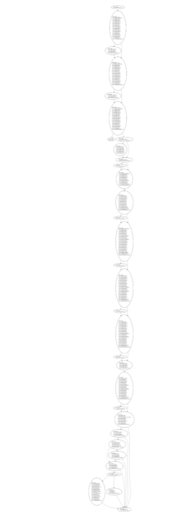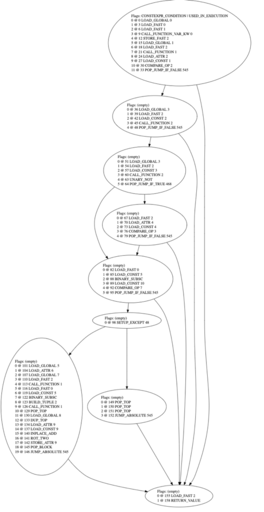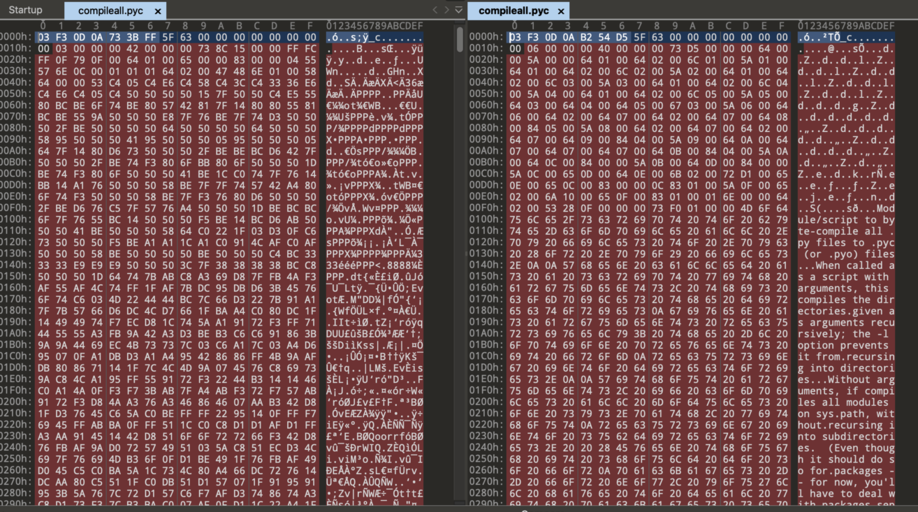Fodeu o bytecode do Python 2.7? Vamos unfuck isso.
unfuck é um utilitário e uma biblioteca para desofuscar o bytecode ofuscado do Python 2.7. É essencialmente uma reimplementação da VM Python com rastreamento de contaminação. Algumas das coisas que o unfuck pode fazer:
#1 e #2 são os dois maiores itens que os descompiladores Python tropeçam ao tentar reconstruir o código-fonte original do Python.
unfuck basicamente faz seu bytecode passar disto para isto:


Ou disto para isto:

Sim, estes são exemplos do mundo real.
unfuck pode ser usado como uma biblioteca ou um utilitário de linha de comando.
unfuck 0.2.0
USAGE:
unfuck [FLAGS] [OPTIONS] <input-obfuscated-file> <output-path> [graphs-dir] [SUBCOMMAND]
FLAGS:
--dry Dry run only -- do not write any files
-g Enable outputting code graphs to dot format
-h, --help Prints help information
-q Disable all logging
-V, --version Prints version information
-v Enable verbose logging
OPTIONS:
--decompiler <decompiler> Your favorite Python 2.7 bytecode decompiler. This program assumes the decompiler's
first positional argument is the file to decompile, and it prints the decompiled
output to stdout [env: UNFUCK_DECOMPILER=] [default: uncompyle6]
ARGS:
<input-obfuscated-file> Input obfuscated file
<output-path> Output file name or directory name. If this path is a directory, a file will be
created with the same name as the input. When the `strings-only` subcommand is
applied, this will be where the output strings file is placed
<graphs-dir> An optional directory for graphs to be written to [default: .]
SUBCOMMANDS:
help Prints this message or the help of the given subcommand(s)
strings-only
Para descompactar um único arquivo:
# deobfuscated.pyc can also be a directory
unfuck obfuscated.pyc deobfuscated.pyc
Você também pode fornecer sinalizadores adicionais para despejar strings em um arquivo ou despejar gráficos dot que podem ser visualizados no graphviz:
# -g is for printing graphs
unfuck -g obfuscated.pyc deobfuscated.pyc
# use the strings-only subcommand for dumping just dumping strings -- no deobfuscation is performed
unfuck deobfuscated.pyc ./strings.csv strings-only
unfuck requer Python 2.7 no PATH do seu sistema. Depois de garantir que ele esteja presente, você poderá apenas cargo build . Se por algum motivo o interpretador correto não puder ser encontrado, tente definir o PYTHON_SYS_EXECUTABLE env var para o caminho do seu interpretador Python 2.7.
cargo install --force unfuck
NOTA: unfuck não foi originalmente projetado pensando no uso da biblioteca e, portanto, traz sua própria plataforma multithreading (neste caso, Rayon).
O uso é bastante simples:
use std :: convert :: TryInto ;
use std :: fs :: File ;
let mut pyc_contents = vec ! [ ] ;
let pyc_file = File :: open ( "obfuscated.pyc" ) ? ;
pyc_file . read_to_end ( & mut pyc_contents ) ? ;
// magic/moddate are specific to the PYC header and are required to be
// a valid PYC file
let magic = u32 :: from_le_bytes ( pyc_contents [ 0 .. 4 ] . try_into ( ) . unwrap ( ) ) ;
let moddate = u32 :: from_le_bytes ( pyc_contents [ 4 .. 8 ] . try_into ( ) . unwrap ( ) ) ;
let pyc_contents = & pyc_contents [ 8 .. ] ;
// Use a standard Python 2.7 opcode table
let deobfuscator = unfuck :: Deobfuscator :: < pydis :: opcode :: py27 :: Standard > :: new ( pyc_contents ) ;
let deobfuscator = if enable_graphs {
deobfuscator . enable_graphs ( )
} else {
deobfuscator
} ;
let deobfuscated_code = deobfuscator . deobfuscate ( ) ? ;
let mut deobfuscated_file = File :: create ( "deobfuscated.pyc" ) ? ;
deobfuscated_file . write_all ( & magic . to_le_bytes ( ) [ .. ] ) ? ;
deobfuscated_file . write_all ( & moddate . to_le_bytes ( ) [ .. ] ) ? ;
deobfuscated_file . write_all ( deobfuscated_code . data . as_slice ( ) ) ? ; gabe_k, yrp, lpcvoid, pessoal do disco WD, squif, ian, pie doom, saruhan